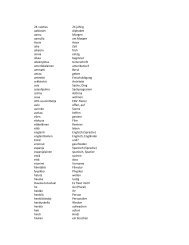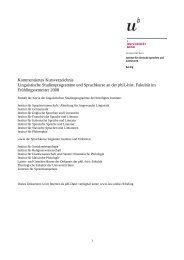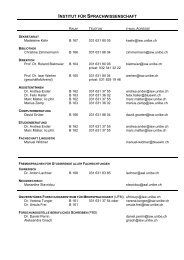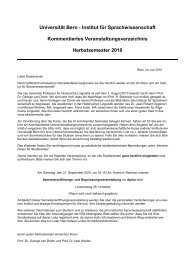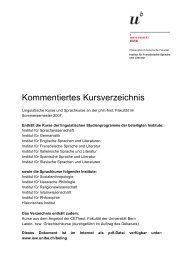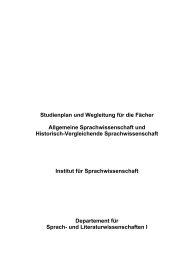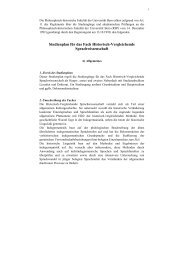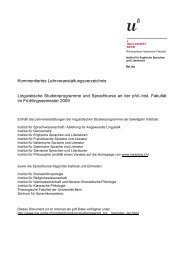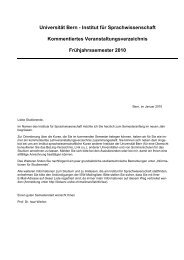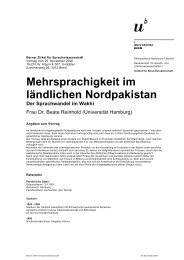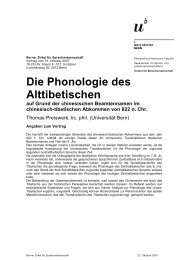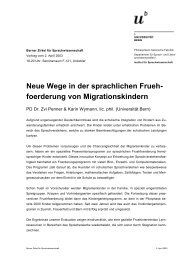The expression of modality in Korean - Institut für ...
The expression of modality in Korean - Institut für ...
The expression of modality in Korean - Institut für ...
Create successful ePaper yourself
Turn your PDF publications into a flip-book with our unique Google optimized e-Paper software.
22<br />
have to be learnt at one stage or another <strong>of</strong> our socialization 18 . <strong>The</strong> notions encoded as modal<br />
attitudes <strong>in</strong> dynamic <strong>modality</strong> and the sources which <strong>in</strong> general trigger such an attitude are as<br />
follows:<br />
(21) notion attitude<br />
ability dispositional ability<br />
<strong>in</strong>ternal knowledge<br />
acquired knowledge<br />
modal source <strong>in</strong>nate disposition, knowledge<br />
1.1.3.6. Volitive <strong>modality</strong><br />
What I shall call volitive <strong>modality</strong> <strong>in</strong> my analysis is otherwise <strong>of</strong>ten refered to as<br />
„boulomaic“ <strong>modality</strong> (e.g. Perk<strong>in</strong>s (1983), Palmer (1986, 12 - who po<strong>in</strong>ts out that actually it<br />
should be bouletic), etc.), which is based on Rescher’s (1968) „boulomaic“ and is concerned<br />
with the notion „X hopes/fears/regrets/desires that p“, but also has traits reach<strong>in</strong>g back to<br />
Jespersen’s (1924, 320f) treatment <strong>of</strong> optative and desiderative <strong>in</strong> which he contrasts between<br />
what is realizable and what is non-realizable. This b<strong>in</strong>ary dist<strong>in</strong>ction is translated by Palmer<br />
(1986, 116) <strong>in</strong>to wish<strong>in</strong>g (unreal) and hop<strong>in</strong>g (real). While this argument has its loopholes (it<br />
is based on <strong>in</strong>stances <strong>of</strong> wishes <strong>in</strong> conjunction with irrealis conditionals, but wishes may also<br />
be found with realis conditionals where no <strong>in</strong>terpretation as „impossible wish“ is compulsory)<br />
it is justified to a large extent by the follow<strong>in</strong>g grammatical dist<strong>in</strong>ction (i.e. change <strong>of</strong> tense)<br />
<strong>in</strong> English (which uses lexical items (namely the two verbs to hope, to wish) for the<br />
<strong>expression</strong> <strong>of</strong> hopes and wishes (examples taken from Palmer (1986, 117):<br />
(22a)<br />
I hope John is here now<br />
I MS hope MA John MU is here now MP [implicit 1sg] MSo<br />
[(hope) M ((I) (John) (is here now)) P ]<br />
18 As the examples illustrate, Ch<strong>in</strong>ese has an overtly marked dist<strong>in</strong>ction not only between dynamic and epistemic<br />
possibility, but also as regards the two different sub-types <strong>of</strong> dynamic <strong>modality</strong> (a further possible dist<strong>in</strong>ction,<br />
though not marked <strong>in</strong> Ch<strong>in</strong>ese, would be between <strong>in</strong>ternal and acquired knowledge), whereas some languages<br />
mark no dist<strong>in</strong>ction at all (e.g. English can) and others dist<strong>in</strong>guish partially (e.g. French savoir vs. pouvoir).



